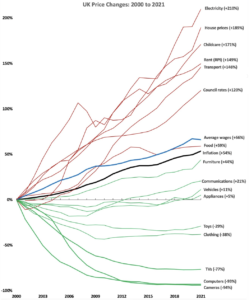Save families £9,000 a year by cutting red tape in housing, childcare, and energy
SUGGESTED

Julian Jessop quoted in the Daily Mail

Kristian Niemietz writes for CapX

The next Prime Minister should focus on radical supply-side reform over handouts to dramatically reduce the cost of living.
- Policymakers and campaign groups tend to focus on tackling the symptoms of high living costs rather than addressing the underlying causes.
- Cash transfers, which risk further inflationary pressures, act as mere sticking plasters.
- Instead, reducing regulatory barriers and tax burdens in several areas — including childcare, housing energy, imported goods, food and labour regulation — would help lower prices for consumers.
- Regulation adds considerably to the cost of living as it can discourage investment, hinder innovation, damage growth and increase costs to businesses that are then pushed onto consumers.
- It has particularly negative impacts on lower-income households, who spend a greater proportion of their income on highly regulated goods such as housing, transportation, utilities, and food and alcohol.
- Relaxing childcare regulatory requirements could cut costs by around 40 per cent, or over £300 per child per month.
- Easing planning restrictions could see private sector rents in England fall by 35 per cent, saving a typical household around £250 per month.
- Deregulation of the energy market and tax cuts could reduce transport costs for the average consumer by £200-250 a year, and energy bills by around £240.
- Cutting ‘nanny-state’ taxes on tobacco and alcohol could save individuals up to £140 a month.
The government should cut red tape to lower costs for households, according to a new report from the Institute of Economic Affairs.
Over the past twenty years, prices in highly regulated fields such as housing, education and transport, have seen a real-terms price increase. By contrast, in sectors relatively open to international trade, competition and innovation, such as toys, clothing, cameras, computers, televisions and furniture, prices have declined. Addressing these interventions could reduce the cost of living for the worst off, with little cost to the Treasury and substantial economic benefits.
The following recommendations are made in new IEA report Cutting Through: How to address the cost of living crisis:
Childcare
- The annual cost of full-time childcare for an under-two-year-old has risen by 171 per cent since 2000, from £5,148 to £13,939 in 2021. This is significantly faster than the rate of increase in household earnings (68 per cent) over the same period. Government has driven up costs by imposing stringent regulatory requirements on the sector.
- The government could remove or reduce staff-to-children ratios; allow other parents and family members to provide childcare for pay, even if not formally accredited by Ofsted; relax requirements for formal accreditation to become a childminder; and reduce or remove regulatory requirements, such as the EYFS, and oversight of nurseries – allowing standard-setting through private accreditation initiatives, quality comparison websites and parental oversight.
- Reforming these regulations could cut costs by around 40 per cent, reducing monthly childcare costs for one child by £360 and £4,300 per year.
Housing
- The ratio of median house prices to median gross full-time annual earnings has gone up from under 4 in the late 1990s to over 9 today. England would have to build close to 2 million additional homes just to catch up with the OECD average, and 3.4 million to match the EU average of housing stock, adjusted for population size.
- The severity of land use planning restrictions is a key determinant of housing costs. The government could remove green belt protection from land that is not particularly green anyway; introduce ‘street votes’ which would allow residents to self-regulate; and localise tax revenue associated with development to make it lucrative for local authorities to attract residents and businesses.
- Easing such restrictions to bring housing costs back into line with the historic norm would imply a drop by at least 40 per cent. Median private sector rents in England could fall by over £250 a month.
Nanny state
- A moderate drink and smoker spends £139 per month on ‘sin taxes’, 13.4 per cent of his or her income. The revenue from these taxes on alcohol, cigarettes and sugary drinks vastly exceeds any plausible estimate of the negative externalities associated with the activity.
- There is very little evidence that paternalistic measures such as minimum unit pricing on alcohol and the planned BOGOF ban, which is estimated to cost an average household £634 annually, have any effect on reducing vice-related harms.
Employment regulation
- Recent governments have greatly increased state involvement in the labour market, including a rise in occupational licensing, which limits the ability of people to enter particular jobs without certification and government approval. Around a fifth of all UK workers now require a government licence for their job, a proportion which has doubled in the last twenty years.
- A comprehensive review of occupational licensing could usefully be undertaken with a view to increasing competition and boosting productivity. An OECD study has recently suggested that there are potential gains of up to 1.5 percentage points of GDP. As a priority, the government should abandon recent moves towards licensing of state agents, which will add to the cost of buying a house.
Immigration restrictions
- The government’s new immigration system is potentially worsening shortages of some important groups of workers. For example, the House of Commons Environment, Food and Rural Affairs Committee recently reported that the difficulties of the farming and food processing industries in recruiting staff have been exacerbated by the complicated and expensive bureaucratic procedures involved in bringing in workers from outside the UK.
- The post-Brexit immigration system has allowed temporary (three-year) visas for poultry workers, pork butchers and HGV drivers, but the costs and difficulties of using these routes have meant they have not had their desired effect. The cost of hiring 10 employees through the Skilled Worker Visa scheme is over £400,000, contrary to government communications lauding its modest cost. There is a strong case for a less centrally-planned immigration policy.
Trade
- A large proportion of goods are imported, and so their cost is influenced by trade policy and subject to tariff and non-tariff barriers. Leaving the single market and customs union has led to new trade barriers with the EU that have not yet been offset by unilateral reforms or gains from trade elsewhere.
- Progress could be made by the UK unilaterally eliminating tariffs, and recognising regulatory standards from countries whose standards are broadly equivalent to ours. In the first instance this should mean continuing to accept EU standards and the CE mark.
Energy
- The UK has an inefficient, unnecessarily costly decarbonisation strategy, which drives up energy costs for households and businesses by more than what is required in order to reduce CO2 emissions.
- To provide immediate relief to high energy prices, the government could constrain the cost of carbon caused by the UK ETS by using the Cost Containment Mechanism; remove VAT on fuel and implement zero-rate VAT across all energy markets, not just domestic; reform the renewables obligation and cancelling the subsidy element of the RO; and direct any windfall from the net stable funding ratio (NSFR) to fund welfare and a 10p cut in fuel duty.
- Cutting this regulation would reduce annual transport costs by £200-250, energy bills by about £240.
Matthew Lesh, IEA Head of Public Policy and co-editor of ‘Cutting Through’, said:
“Red tape is strangling British households with higher costs. From housing to childcare and energy, decades of interventions have made living costs more expensive. The cost of living crisis is an ideal opportunity to reconsider the underlying policies that are driving up costs for families. The constant demands for more handouts and higher pay are a distraction; Britain needs a serious supply-side reform agenda that would significantly boost quality of life for millions, make life easier for entrepreneurs and unlock our stalled productivity.”
Dr Kristian Niemietz, IEA Head of Political Economy and co-editor of ‘Cutting Through’, said:
“While the government obviously cannot control geopolitical events, the problem with the current cost-of-living crisis is that we were already starting from a bad place. In a number of important sectors, government policy is systematically driving up the cost of living for no good reason, and has been doing so for a long time. I first wrote about these issues over a decade ago, and find it remarkable how little the fundamentals have changed since then.”
ENDS
Notes to editors
Contact: media@iea.org.uk, 07763 365520
IEA spokespeople are available for interview and further comment.
Cutting Through: How to address the cost of living crisis is under embargo until 00.01 Wednesday 27 July. An embargoed copy of the paper can be found here: https://iea.org.uk/wp-content/uploads/2022/07/Cutting-Through-1.pdf
The mission of the Institute of Economic Affairs is to improve understanding of the fundamental institutions of a free society by analysing and expanding the role of markets in solving economic and social problems. The IEA is a registered educational charity and independent of all political parties.




